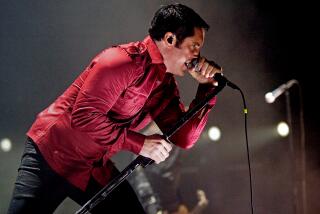‘Motherless Brooklyn’ as concert film? Yes, when Wynton Marsalis and Thom Yorke take part
When Edward Norton, who wrote, directed and starred in “Motherless Brooklyn,” began planning its music, he didn’t fool around.
He enlisted two superstars of their respective genres: jazz great Wynton Marsalis and singer-songwriter Thom Yorke of Radiohead. He then added a rising star in the film-composing world, Daniel Pemberton (“Steve Jobs”), to stitch it all together with an original score.
The film takes place in late 1950s New York and features an unusual hero: a private detective with Tourette syndrome whose investigation into his boss’ murder takes him, more than once, to a Harlem nightspot.
“I loved the idea that jazz, which has such an improvisational and obsessive-compulsive way of taking a riff, exploring it, breaking it down and twisting it around, seems like such a very Tourettic musical form, especially bop and hard bop from the mid-to-late ’50s,” Norton says. “I knew jazz was going to be one component to the actual story of the film.”
Norton first checked with an old friend, trumpeter-composer Marsalis, the artistic director of New York’s Jazz at Lincoln Center. “He was an automatic call for me when it came to accurately depicting not only what those clubs were like but what would have been played.”
“We started to talk about it a couple of years ago,” Marsalis adds by phone from New York. “We went over the tunes, I wrote the arrangements, and we used some of our Juilliard students, fantastic young musicians, to play.”
Marsalis assembled a five-piece band, consisting of both veterans and students, to play the Clifford Brown-Max Roach “Blues Walk,” Charles Mingus’ “Jump Monk” and other period tunes.
But, Norton says, he also needed a ballad for “an important emotional moment in the film, to create a moment of bonding and lightness between Lionel [Norton’s character] and Laura,” as played by Gugu Mbatha-Raw. That’s when he called Yorke.
“His songs have longing and loneliness and yearning in them, but also dissonance,” Norton notes. “I had him read the script. We talked about this notion I had of personal struggle, personal anguish, but with an overlay of a sense of living in dark times. He came back with this song, ‘Daily Battles.’”
Yorke was initially skeptical about whether he even wanted to try. “Listen, I’m definitely not a jazz guy,” he says by phone from London. “I can’t sit down and do jazz arrangements, not in a million years,” the songwriter recalls telling Norton.
“But there was something about the story being told that pressed my buttons,” Yorke concedes. “Much of the story was about the little people having no say, no voice, having to get up every day, go back and try and start again. I sent [the song] to him, but I still wasn’t convinced until Ed showed me this clip of Wynton’s arrangement for the scene where they’re dancing in the club. That was extraordinary. What I wrote was really simple, deliberately kind of cold, and they turned it into something much more soaring and emotional.”
The final film contains both Yorke’s vocal version and Marsalis’ jazz arrangement (performed, Miles Davis-style, with a Harmon-muted trumpet). Norton even added references to Yorke’s lyrics into the script, as when Lionel complains about his medical condition and Laura responds, “We’ve all got our daily battles.”
Members of Marsalis’ band are actually on screen, pretending to play those numbers in the club (Marsalis is absent, but as Norton says, “he’s the secret real trumpet behind Michael K. Williams,” the actor billed as Trumpet Man).
Pemberton, the English composer responsible for the dramatic score, “is one of the really protean talents in film music right now,” Norton says. Pemberton, who was recently in Los Angeles working on his next score for the Harley Quinn movie “Birds of Prey,” recalled meeting Norton late one night in a London pub near the end of 2018.
Exhausted after finishing “Spider-Man: Into the Spider-Verse,” the composer was reluctant to jump into another project but was intrigued by the possibilities. “We should use the sound world of jazz, saxophones, trumpets, pianos, double bass, drums, but approach it in a way that’s very modern,” he told the director.
Pemberton recorded a London saxophonist playing unusual riffs and patterns, which he then mixed with strings and woodwinds in sometimes dreamy, sometimes dissonant colors.
“Lionel has this fidgety, unsettled mind, so you have this abstract, avant-garde element in the score, which is very much Lionel’s mind, unstable, constantly moving from one thing to another,” he says. He wrote lyrical, melodic passages for Lionel and Laura (later recorded by Marsalis’ jazz group) and what he calls a “grand orchestral mystery element” representing the hidden, corrupt power structure personified by Alec Baldwin’s character.
“He built the connective tissue of the film,” Norton says of Pemberton, who wrote and produced the entire score in four weeks.
“Making the music was a total joy,” Norton adds. “These three guys came in, and I was floating the whole time I was working with them. They elevated my film.”
More to Read
Only good movies
Get the Indie Focus newsletter, Mark Olsen's weekly guide to the world of cinema.
You may occasionally receive promotional content from the Los Angeles Times.









